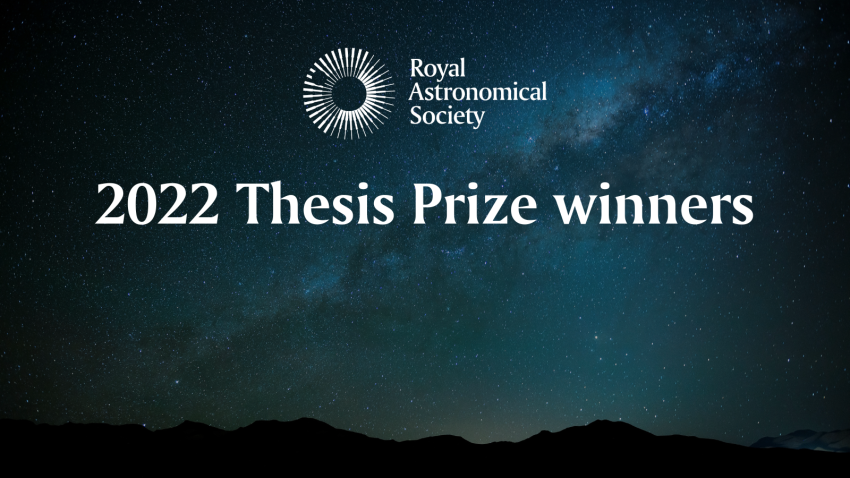The RAS is pleased to announce the winners of its prizes for the best Ph.D. theses completed in the UK during 2022.
Prizes are awarded annually: the Michael Penston Prize for the best thesis in astronomy and astrophysics, the Keith Runcorn Prize for the best thesis in geophysics and planetary science, and the Patricia Tomkins Prize for the best thesis in instrumentation science for astronomy and geophysics.
The Michael Penston Thesis Prize 2022
The Michael Penston Thesis Prize 2022 has been awarded to Dr David Hosking for the thesis entitled 'The decay of MHD turbulence and the primordial origin of magnetic fields in cosmic voids'.
David Hosking completed his DPhil in Astrophysics at the University of Oxford in 2022, under the supervision of Professors Alex Schekochihin and Steven Balbus. He now holds a postdoctoral fellowship at Princeton Centre for Theoretical Science and a research fellowship at Gonville & Caius College, Cambridge. Dr Hosking’s research uses a combination of analytical theory and numerical experiments to study waves, instabilities, and turbulence in astrophysical fluids and plasmas.
His thesis proposed, and confirmed with numerical simulations, a new theory of the decay of magnetohydrodynamic turbulence that combined powerful new invariants with a view of magnetic reconnection as the dominant dynamical process. Dr. Hosking’s thesis further analysed the consequences of his theory for the evolution of primordial magnetic fields in the early Universe, finding that modern-day relics of primordial fields would be several orders of magnitude stronger than indicated by previous theoretical models.
The runners-up are Nora Eisner for the thesis entitle 'People Powered Planet Hunting with TESS', and Andrew Mummery, for the thesis entitled 'Tidal Disruption Events with a Time-Dependent Theory of Relativistic Accretion Disks'.
The Patricia Tomkins Thesis Prize 2022
The winner of the 2022 Patricia Tomkins Thesis Prize is Dr Daniel Mortimer for the thesis entitled 'Designing a beam combiner for faint limiting magnitudes in optical interferometry'.
Dr Mortimer completed his PhD at the University of Cambridge where he designed, built, and tested FOURIER, the first-generation science beam combiner for the Magdalena Ridge Observatory Interferometer (MROI) under the guidance of Professor Buscher.
He is currently a postdoctoral research fellow at the University of Exeter. He is currently working on observations and engineering for the MIRC-X instrument, located at the CHARA array, and BIFROST, a proposed high spectral resolution J band instrument for the VLTI.
In September 2023 he will take up a position at the Max Planck institute for Astronomy (MPIA), where he will assist in the assembly, integration, verification of the single conjugate adaptive optics system for the ELTs METIS instrument.
The Keith Runcorn Thesis Prize 2022
The winner of the 2022 Keith Runcorn Prize is Dr Peter Stephenson for the thesis entitled 'Origin, evolution and impact of electrons at comet 67P'.
Dr Stephenson completed his PhD at Imperial College London in 2022, focusing on understanding the cometary environment in the wake of the European Space Agency’s (ESA) Rosetta mission to comet 67P. Through analysing measurements from the Rosetta mission in conjunction with numerical modelling, he investigated the role of electrons in driving ionization and auroral emissions at comets.
In late 2022, Dr Stephenson joined the Lunar and Planetary Laboratory at the University of Arizona, where he is examining ultraviolet emissions from Saturn. His work uses observations from the Cassini mission to constrain the Saturnian atmospheric structure and energy transport through the planet. Moving forward, Dr. Stephenson will be pursuing this research in the coming years, with an eye towards the arrival of the recently launched JUICE mission and of Comet Interceptor at their destinations.
The runner-up is James Ward for the thesis entitled 'Analysis of Mantle Heterogeneity through Array Observations of Multipathing and its Expansion to a Global Scale'.
Congratulations to our winners and runners up!


